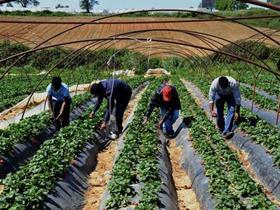
Britain's fruit industry has expressed serious concerns over growers' ability to source labour post-Brexit.
Representatives of leading soft- and top-fruit industry bodies have made impassioned pleas to government to put mechanisms in place to ensure a ready supply of labour.
British Summer Fruits said its members were 'very concerned' by the result of the referendum, adding that if there are limits on EU nationals' right to work in the UK in future, then a seasonal workers' entry permit scheme must be introduced instead.
'The decision by the UK electorate to leave the EU will mean that there is now a serious question mark over the future availability of sufficient numbers of seasonal workers to harvest our 100,000 tonne annual crop of berries between March and October,' said BSF chairman Laurence Olins.
'Currently seasonal staff are predominantly EU workers freely travelling to the UK during this period. This is because, despite numerous government-sponsored initiatives, UK residents do not have the appetite to work in our fields and packhouses on a seasonal basis.'
Olins stressed that 'the whole viability of our home-grown industry' will be at risk if the available labour pool is curtailed, adding that growers would be unable to meet demand without the thousands of seasonal workers they employ.
'The likely result is that berries will be imported, at high prices and environmental costs, both of which would be against the wishes of the UK consumer,' Olins said. “Also British farmers could decide to transfer some of their enterprises to northern Europe where there is an ample supply of labour and suitable land. Either option would be a negative result for our country, the economy and the consumer.”
That view was echoed by Adrian Barlow, chairman of English Apples & Pears, who said that the prominence of the immigration issue in the Brexit debate made it likely that there would be a future reduction in immigrants coming to this country.
'Apples and pears are harvested by hand, for which seasonal workers are required,' explained Barlow. 'Despite enormous efforts by growers, which has included joint action with labour providers, government departments and Job Centres, it has proved impossible to recruit from the UK any more than a small proportion of the numbers necessary.
'In short, the British are not prepared to undertake this type of work. Consequently, almost all seasonal workers are from abroad, and at present, mainly from eastern Europe.
'The UK apples and pears sector requires about 12,000 seasonal workers per annum. Unless they can be recruited from abroad, many growers will be forced to cease production, which will damage local businesses, local economies, the national economy and deprive consumers from enjoying the finest tasting apples in the world.
'It is vital that the UK government takes into consideration the essential requirement for seasonal workers from abroad in order to allow the commercial production of apples and pears in the UK to continue, and that policies are implemented accordingly.'



